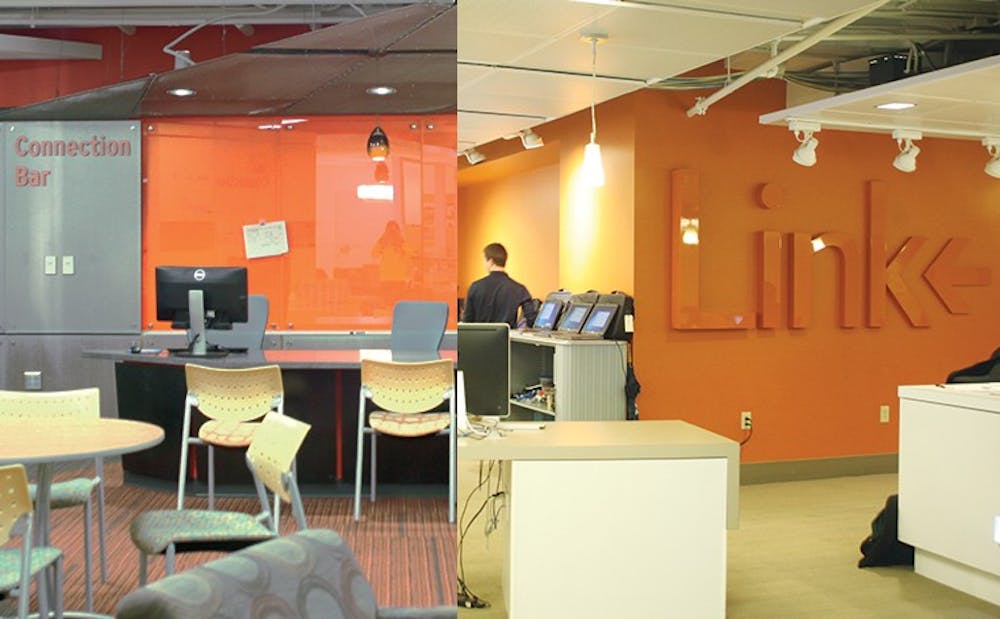The Connection Bar, located on the second floor of Gross Hall, offers students and faculty many resources for accomplishing their research goals. The bar is modeled after Apple’s Genius Bars and is staffed by several graduate students throughout the day who can provide detailed assistance on all steps of the research process. Affiliated with the Social Sciences Research Institute, the bar also encourages interdisciplinary cross-talk and aims to help clients across a wide variety of departments.
Jonathan Morgan, a graduate student in sociology who works at the Connection Bar, said it was created for three primary purposes—to help researchers organize data collection, to expose different research methods across multiple departments and to serve as an open atmosphere for answering general research design questions.
“I think the Connection Bar is a really wonderful idea and addition to the services Duke provides,” said Alison Koenka, a fellow in the Department of Psychology and Neuroscience who staffs the Connection Bar. “I’ve really enjoyed interacting with students and faculty at different stages of their academic careers.”
The computers the bar uses for consulting are PCs loaded with data analysis software, but personal Macs are also available, Koenka said. Moreover, Koenka said the bar recently added a chat feature that allows students to ask questions online without coming in directly to the desk for help.
Koenka is well-versed in meta-analysis software to integrate results from different studies, but she said the Connection Bar is most effective due to the extensive and different software each graduate student assistant specializes in. The work she has done as a consultant at the bar has not only helped others but also aided in her own education.
Alexandra Cooper, associate director of education and training at the Social Science Research Institute, said the Connection Bar is able to serve anybody in any department interested in social and behavioral research topics. Cooper said the bar arose as a team effort in part to help connect various disciplines, and the connections developed by the scholars working for the bar have helped facilitate conversations about research happening at Duke.
Cooper stated that maintaining the Connection Bar is relatively low-cost under the SSRI’s budget and that the desks are not in competition with the similar Link help desk in Perkins Library. She also added that it is not infrequent for either desk to refer students to the other desk for help with specific issues.
“I see it much more as both groups try to support the people who are on site,” Cooper said. “There is sort of a... standard level of support that all of us try to provide, and we all specialize in different things.”
The Link, which opened in August 2008, currently sees around 75 to 125 visitors on an average day during the week and commonly helps students with more technical tasks such as resolving personal laptop issues and circulating multimedia equipment for use, said Cara Bonnett, communications strategist for the Office of Information Technology. She noted that the two desks have the capacity to work collaboratively.
“The Link desk provides comprehensive campus service for student technical problems,” Bonnett wrote in an email Tuesday. “Our understanding is that the Connection Bar is focused on research and software support related to research.”
Morgan noted that the number of graduate and undergraduate students who come in for help with their projects seems to fluctuate throughout the semester.
“At the beginning of the semester, we may see maybe ten people in a day across our shifts, and they’ll mostly be graduate students or researchers,” Morgan said. “But when we get closer to exam time, we get many more people coming in... we do help them [figure out] how stats packages work, how Qualtrics work.”
Morgan said he was initially skeptical of the Connection Bar’s placement in Gross Hall and the amount of traffic it would get there. But because of the Gross Hall renovations and the popularity of the complimentary snacks and coffee, he anticipates that the Bar will likely remain in its current location for quite a while.
The Connection Bar is currently open with drop-in hours 10 a.m. until 6 p.m. on weekdays.
Get The Chronicle straight to your inbox
Signup for our weekly newsletter. Cancel at any time.

